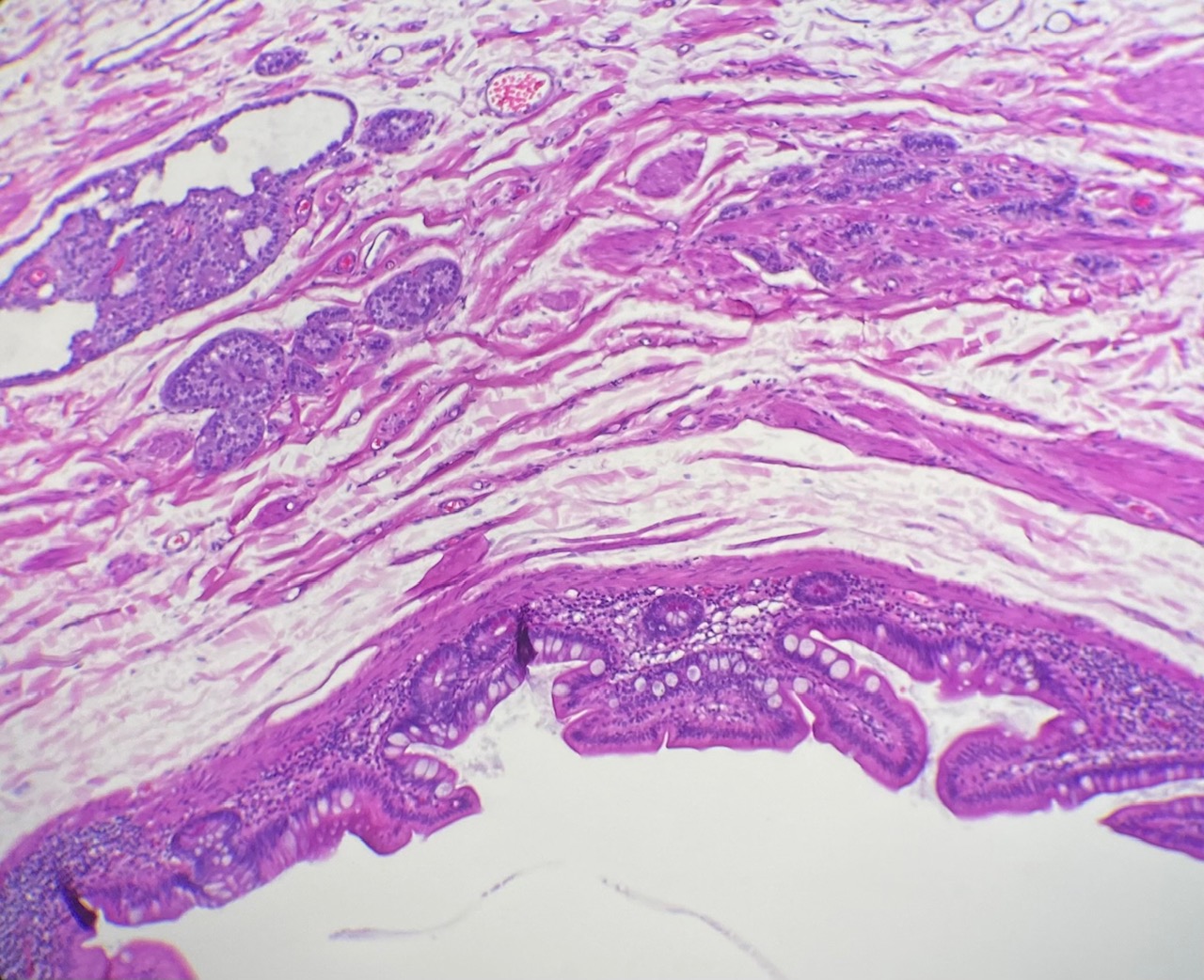Sunday Poster Session
Category: Small Intestine
P1992 - From Capsule to Diagnosis: An Unusual Case of Meckel’s NET
Sunday, October 26, 2025
3:30 PM - 7:00 PM PDT
Location: Exhibit Hall

Junaid khan, MD
Tidal Health
Salisbury, MD
Presenting Author(s)
Junaid Khan, MD1, Mohammad Hamza, MD2, Maryam salma. Babar, MBBS3, Osama Kaddourah, MD, MPH4
1Tidal Health, Salisbury, MD; 2Tidalhealth, Salisbury, MD; 3Cleveland Clinic Abu Dhabi, Abu Dhabi, Abu Dhabi, United Arab Emirates; 4TidalHealth Peninsula Regional, Salisbury, MD
Introduction: Meckel's diverticulum (MD) is the most common congenital gastrointestinal anomaly. Among the malignancies associated with MD, neuroendocrine tumors (NETs) are the most common, representing approximately one-third of the tumors in this area. NETs developing within Meckel’s diverticulum are rare, with only 162 cases documented over 11 years in the National Cancer Database (NCDB), which covers about 70% of cancer diagnoses in the United States. We present a case of MD associated with a well-differentiated neuroendocrine tumor in an elderly patient.
Case Description/
Methods: 80-year-old male with a past medical history of history of tonsillar cancer with chronic oropharyngeal dysfunction requiring PEG tube placement. Patient presented due to a chief complaint of syncopal episode associated with generalized weakness. Gastroenterology recommended a capsule endoscopy study to further evaluate this melena of obscure origin, given nondiagnostic prior endoscopic studies. Reviewing the images from the PillCam showed possible retention of the device at a diverticulum with associated bleeding. A CT scan was ordered to visualize better the location of the device, which showed the device in the loop of a small bowel in the left lower quadrant, possibly in the area of jejunum. Given that double-balloon enteroscopy (DBE) was not available at our facility, general surgery was involved for the extraction of the capsule. The patient underwent open small bowel resection where the diverticulum was identified in the ileum with the retained video capsule enteroscopy and subsequently resected. Given the distance from the ileocecal valve, the suspicion was that it was likely a Meckel's diverticulum. Biopsy results confirmed the presence of MD associated with a well-differentiated neuroendocrine tumor (G1).
Discussion: NETs arising from MD are rare. While NETs arising from the appendix (another true diverticulum) have low metastatic potential at small sizes and can often be treated with appendectomy, NETs from the ileum, where MD is most commonly located, have a high risk of metastasis regardless of size. Prophylactic resection of Meckel’s diverticulum is generally not recommended in adults but may be considered in pediatric patients or those who meet specific criteria, such as male gender, age under 50, and diverticulum longer than 2 cm. Studies suggest that even small-sized Meckel’s NETs can metastasize, and thus, regional lymphadenectomy should be considered during resection.

Figure: The image is H and E of the Meckels at 200x showing a neuroendocrine cell proliferation involving the thinned muscularis propria.

Figure: Hyperdense retained capsule
Disclosures:
Junaid Khan indicated no relevant financial relationships.
Mohammad Hamza indicated no relevant financial relationships.
Maryam Babar indicated no relevant financial relationships.
Osama Kaddourah indicated no relevant financial relationships.
Junaid Khan, MD1, Mohammad Hamza, MD2, Maryam salma. Babar, MBBS3, Osama Kaddourah, MD, MPH4. P1992 - From Capsule to Diagnosis: An Unusual Case of Meckel’s NET, ACG 2025 Annual Scientific Meeting Abstracts. Phoenix, AZ: American College of Gastroenterology.
1Tidal Health, Salisbury, MD; 2Tidalhealth, Salisbury, MD; 3Cleveland Clinic Abu Dhabi, Abu Dhabi, Abu Dhabi, United Arab Emirates; 4TidalHealth Peninsula Regional, Salisbury, MD
Introduction: Meckel's diverticulum (MD) is the most common congenital gastrointestinal anomaly. Among the malignancies associated with MD, neuroendocrine tumors (NETs) are the most common, representing approximately one-third of the tumors in this area. NETs developing within Meckel’s diverticulum are rare, with only 162 cases documented over 11 years in the National Cancer Database (NCDB), which covers about 70% of cancer diagnoses in the United States. We present a case of MD associated with a well-differentiated neuroendocrine tumor in an elderly patient.
Case Description/
Methods: 80-year-old male with a past medical history of history of tonsillar cancer with chronic oropharyngeal dysfunction requiring PEG tube placement. Patient presented due to a chief complaint of syncopal episode associated with generalized weakness. Gastroenterology recommended a capsule endoscopy study to further evaluate this melena of obscure origin, given nondiagnostic prior endoscopic studies. Reviewing the images from the PillCam showed possible retention of the device at a diverticulum with associated bleeding. A CT scan was ordered to visualize better the location of the device, which showed the device in the loop of a small bowel in the left lower quadrant, possibly in the area of jejunum. Given that double-balloon enteroscopy (DBE) was not available at our facility, general surgery was involved for the extraction of the capsule. The patient underwent open small bowel resection where the diverticulum was identified in the ileum with the retained video capsule enteroscopy and subsequently resected. Given the distance from the ileocecal valve, the suspicion was that it was likely a Meckel's diverticulum. Biopsy results confirmed the presence of MD associated with a well-differentiated neuroendocrine tumor (G1).
Discussion: NETs arising from MD are rare. While NETs arising from the appendix (another true diverticulum) have low metastatic potential at small sizes and can often be treated with appendectomy, NETs from the ileum, where MD is most commonly located, have a high risk of metastasis regardless of size. Prophylactic resection of Meckel’s diverticulum is generally not recommended in adults but may be considered in pediatric patients or those who meet specific criteria, such as male gender, age under 50, and diverticulum longer than 2 cm. Studies suggest that even small-sized Meckel’s NETs can metastasize, and thus, regional lymphadenectomy should be considered during resection.

Figure: The image is H and E of the Meckels at 200x showing a neuroendocrine cell proliferation involving the thinned muscularis propria.

Figure: Hyperdense retained capsule
Disclosures:
Junaid Khan indicated no relevant financial relationships.
Mohammad Hamza indicated no relevant financial relationships.
Maryam Babar indicated no relevant financial relationships.
Osama Kaddourah indicated no relevant financial relationships.
Junaid Khan, MD1, Mohammad Hamza, MD2, Maryam salma. Babar, MBBS3, Osama Kaddourah, MD, MPH4. P1992 - From Capsule to Diagnosis: An Unusual Case of Meckel’s NET, ACG 2025 Annual Scientific Meeting Abstracts. Phoenix, AZ: American College of Gastroenterology.
